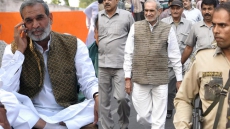Former Prime minister Manmohan Singh said today that India is a "reluctant" nuclear weapon state and that new proliferation risks can lead to "unintended escalations", increasing the likelihood of a nuclear
Dr Singh spoke at the book launch of Observer Reserach Foundation's ''Nuclear Order in the Twenty First Century'', written by former diplomat Rakesh Sood.
"India is the only country that had an extensive and advanced peaceful nuclear programme before we were compelled to shift in response to security threats and the only one that exercised nearly a quarter century of restraint after having demonstrated its technical capability. This is why we decided to base our nuclear doctrine on a credible, minimum deterrent," Dr Singh said.
The existing nuclear global order is coming under strain with some of the old arms control agreements being consigned to history, Mr Singh said. He noted that nuclear science and technology have matured over the last 70 years and it is now easier to access and acquire them.
Developments in artificial intelligence, growing space, and cyber vulnerabilities, have given rise to more uncertainties, he added.
"Many leaders are concerned that these lead to greater unpredictability and compress the time lines for decision making. It can lead to unintended escalation, increasing the likelihood of a nuclear strike, something the world has not seen since 1945. Multipolarity has become a reality in the global economy but the political structures have yet to overcome the inertia of outmoded thinking," Dr Singh said.
"Many countries are modernising their nuclear arsenals with tactical and low yield weapons, increasing the likelihood of their use. The goal of nuclear disarmament seems to be receding," he said.

